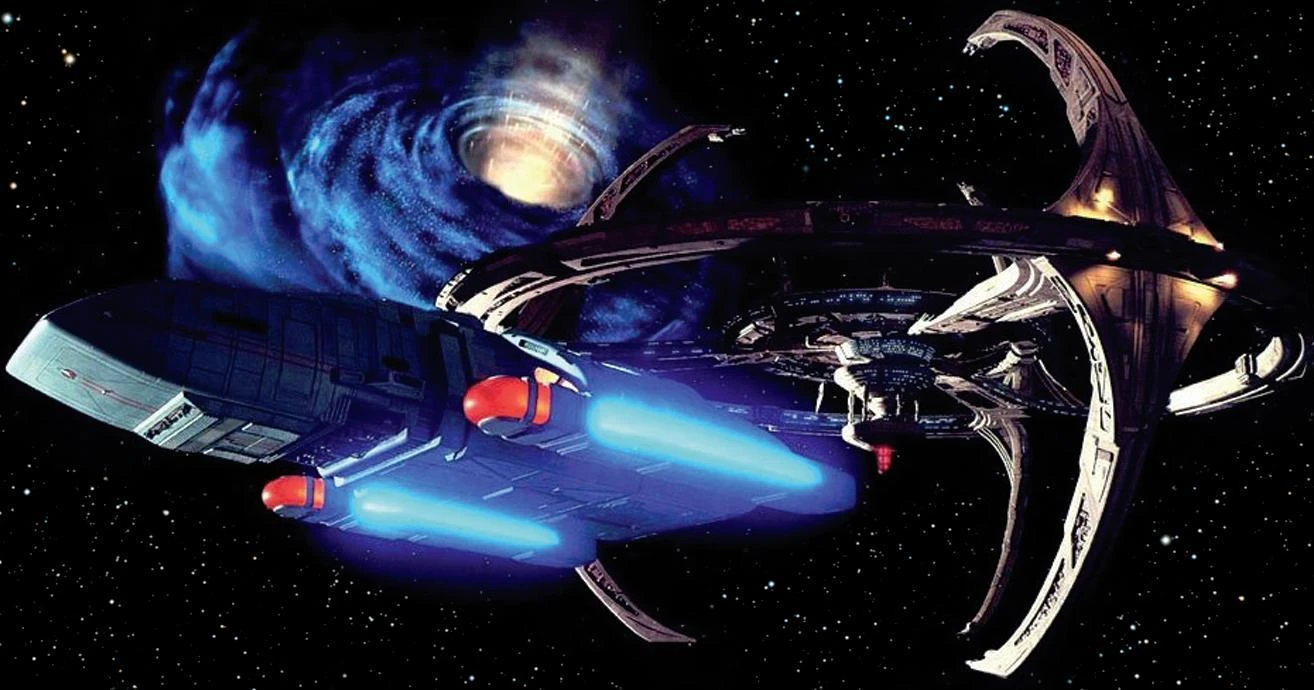The last three months, I sat down to give the series a fair shake. The show survived an impressive seven seasons, not that it was overwhelmingly popular. According to Wikipedia:
Author Terry J. Erdmann commented: "DS9 was never as popular as its two predecessors, although it arguably was a more critically acclaimed series".In fact, it struggled to get a third season. Fans successfully managed a letter-writing campaign to keep the show on. That seemed to be the kick in the pants it needed.
From the beginning, the plots tended to be engaging and strong. The attitude toward religion was largely positive, without needing to beat up characters for whatever belief system.
The actors didn't immediately take to their roles until the last episode of season two when it initiated a more cohesive plot thread uniting the show (possibly due to the threat of cancellation?). From there, the actors occupied their roles in ways that made them feel like actual aliens, not going through the motions. Except for Miles O'Brien and Worf (characters from other shows who had already accustomed themselves to their characters), the actors must have gained a slow, intimate understanding of themselves in relation to the other characters.
In some ways, it may be best to start with the finale of season 2, "The Jem'Hadar", yet one does need context. The most character-driven episode also happens to be the season 1 pilot, "The Emissary", setting up the series. Commander Sisko has been put in charge of a space station out in the middle of nowhere. He wants out of the military, period, still suffering from the loss of his wife. But then a wormhole opens that changes everything.
One of the best episodes of the series, "Duet," guest-starring Harris Yulin should not be missed from season 1. Yulin plays a Cardassian who contracts that he could have only gotten from being part of--if not running--a Bajoran concentration camp. That's the mystery: Who is this humanoid really, and what role did he play? Yulin's acting is impressive, swinging wildly by turns, but always on point.
 Minor episodes from season one might include "Dax" which deepens one's understanding and philosophical complexity of such a being. Popular season 2 episodes--"Necessary Evil " and "Whispers"--have good plots but don't really add to the series arc.
Minor episodes from season one might include "Dax" which deepens one's understanding and philosophical complexity of such a being. Popular season 2 episodes--"Necessary Evil " and "Whispers"--have good plots but don't really add to the series arc.The most moving series episode is when Gul Dukat tries to persuade his daughter to leave Deep Space Nine space station in season 6's "The Sacrifice of Angels, part 2".
Two-part episodes, season openings and finales, on the other hand, tend to develop the series plot, so they are essential if you want to give the series a shot. And it is worth it. Fair warning: you might give up if you try a complete series marathon in the proper order.
My main problem with DS9 is that the Ferengi were not well portrayed, which is the opposite of the Star Trek, usually--especially for a regular. The Ferengi are supposed to be great businessmen of the galaxy, but too few humanoids like them. Who can blame them? Conniving, shrieking, repelling.... They are not intended to be liked. Their evolution makes little sense. Supposedly, they believe in survival of the fittest, but always run. That's fine, but how did they become the intellectual, space-faring powers of their planet by running away? And how did they become salesmen when they are universally disliked? The deck was too stacked against them. The end of the series transforms Ferengis into American liberals without any transition.
The Ferengis need 1) an evolutionary past, 2) an ethos (it's present in the Rules of Acquisition, but this should spring from their evolution), 3) changes/interactions with others based on their ethos, and 4) acceptance in the same way Klingons are accepted in the series--however uneasily. We have seen nothing to lead a wholesale change in the Ferengi way of thinking. DS9 characters change in attitude to more acceptance of the Ferengi, but if they're going to be salesmen, they need to be better charmers and/or talkers.
That aside, I heartily recommend the series.


No comments:
Post a Comment